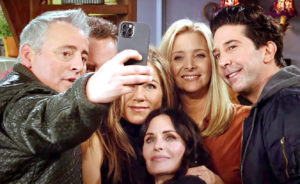There’s a scene in the new apocalypse thriller Leave the World Behind in which a 27-year-old character describes the show Friends as “almost nostalgic for a time that never existed”. Her lip curls with contempt as she says it, and not just for the show itself. Because if Friends was guilty of selling a lie — with its shiny, sanitised, notably non-diverse depiction of life in New York — wasn’t its millennial fanbase equally guilty of buying it? When she sneers at Friends, she’s really sneering at herself, for falling for it.
In this, she represents an entire generation’s penchant for repudiating the culture that shaped it. Nostalgia is resentment-tinged among millennials, for whom being downtrodden and disenfranchised has become something of a permanent calling card. Five years ago, it was a truth universally acknowledged that we would be the first cohort to do worse economically than our parents. Crushed by unmanageable college debt, unable to buy houses or start families, and burned out by the endless demands of side hustling, millennials were surely the unluckiest generation.
The only problem with this universally-acknowledged truth is that, actually, it’s not true: a fact that’s become inescapable this year. “Millennials, as a group, are not broke—they are, in fact, thriving economically,” wrote Jean Twenge in The Atlantic in April. “Since the mid-2010s, Millennials on the whole have made a breath-taking financial comeback.” The data backs this up: although the wealth gap between rich and poor persists within the millennial generation, and the housing market makes home ownership slightly more challenging than it used to be, all the catastrophising seems to have been premature. Millennials are doing fine.
And yet, their image as uniquely put-upon has proved persistent — especially among millennials themselves. Once you’ve entrenched a generational narrative, people will continue to identify with it, irrespective of how things may have evolved. For the same reason that the children of the Sixties styled themselves as anti-establishment hippies from the comfort of their corporate offices, millennials have struggled to let go of the sense that there’s something uniquely difficult about their lives — even as they cruise comfortably into middle age, buying homes, having kids, accumulating assets. But if we’re doing well by every available metric, how can we explain the fact that we feel like such losers?
Enter the successor ideology to the debunked myth of the Left-Behind Millennial: the retrospective problematising of the Nineties. This oeuvre of cultural criticism, devoted to uncovering the evil subtext in every entertainment property produced before 2005, makes a certain kind of sense if you understand it as a coping mechanism for a generation that views their adult lives with not just disappointment but a sense of betrayal. The expectations we internalised — that the world was our oyster, that we would have it all — and which reality has so cruelly failed to meet, were the products of a Nineties paradigm in which millennials were not just avid consumers but guilty participants, victims and perpetrators alike.
Hence why, where other generations dabble in more straightforward nostalgia for their formative years, millennials have developed an antagonistic relationship with them, rewriting and reframing it like a therapy patient searching out the hidden darkness in a seemingly happy childhood. (That this has happened in tandem with the widespread creep of therapy-speak into everyday life is surely not a coincidence.) Actually, your parents’ loving marriage was a sham; actually, your fun-loving father was an alcoholic man-child; and actually, Friends was a cesspit of racist sexist heteronormative bigotry masked as feel-good primetime TV.
The reckoning isn’t solely an American phenomenon: the latest season of The Crown, which opens with Princess Diana’s death in 1997 and doubles as a searing indictment of the tabloid culture of the era, is also a fine example of this sort of meta-commentary. But in the US, exposing the dark underbelly of our youthful obsessions has become a genre unto itself. There’s this year’s memoir boom, in which maligned Nineties icons have spoken their truth in documentaries and bestselling books. Paris Hilton’s memoir of abuse at a boarding school for wayward youth reveals that her “celebutante” antics and baby-voiced bimbo persona were the result of hideous trauma; Britney Spears’s tell-all, The Woman in Me, describes how her apparent career renaissance was actually a puppet show in which she dangled on strings held by a father who managed her life, her finances, her reproductive choices, even the choreography of her Vegas comeback show.
Meanwhile, on HBO, Woodstock 99: Peace, Love, and Rage discovers a sinister valence to the gleeful raunch culture of the Girls Gone Wild era, featuring interviews with the musicians and media figures who were once its vanguard. Now, middle-aged and chagrined, they shake their heads in lemon-faced disapproval at the provocations of toxic male pop metal icons like Limp Bizkit — but also at themselves, for being complicit. The question hanging in the air is: how did we ever think this was okay?
And then there’s Monica Lewinsky, who marked the 25th anniversary of the scandal that made her famous with interviews, articles, even a television series — highlighting how her Nineties-era infamy has transformed to become one of the greatest reputational rehabilitations of all time. In 1998, when the story of her affair with then-President Bill Clinton broke, Lewinsky was a Jezebel, a homewrecker, and a punchline to the worst jokes that the slut-shaming culture of the moment could think of. Now, for exactly the same reason, she’s a feminist hero, toast of the Hollywood elite and NYC social pages alike, greeted with a standing ovation when she walks into a room.
But stigma isn’t the only thing Lewinsky has shed: in the old paradigm, a woman in her early twenties who slept with a married man, even a powerful one, was considered an autonomous actor and old enough to know better. In the revised one, she’s not just a victim, but practically a child. Her shame is gone, but so is her agency — and with it, any sense that she may have had a hand in the current shape of her life.
The cultural revisionism that refashions the wanton seductress as a hapless innocent speaks to the interplay of millennial childhood nostalgia with the overwhelming sense that we still aren’t really adults. The same generation that treats grownup responsibilities like bill-paying or doing laundry as a sort of LARP (“adulting”) is also characterised by its insistent and continued interest in childish things. YA fantasy, Funko Pop dolls, and the Marvel Cinematic Universe have supplanted the more sophisticated ideas and aesthetics that were once the hallmarks of adult taste. Even the most acclaimed millennial creators tend to be backward-looking, revisiting and reframing childhood favourites rather than writing something new, fresh, complex, grown-up.
It was the approach to art expressed earlier this year by Greta Gerwig, director of Little Women and Barbie, when she proclaimed that the latter movie was both “doing the thing and subverting the thing” — the thing in question being Barbie’s pink-tinted, stereotypical, sexist tropes. But the bigger thing to accept about Barbie is not just that she’s sexist, but that she’s simple, in the way kids’ stuff tends to be. Where the irony-tinged approach to millennial nostalgia falls short is not in Gerwig’s notion of the thing that is at once done and subverted; it’s in its failure to comprehend that adulthood means putting aside the toys you used to play with, and doing something else.
The fact is, despite all the think pieces, reckoning with the naughtiness of the Nineties ultimately doesn’t change much. Britney Spears, freshly liberated from her conservatorship, may be understood as a victim to be pitied rather than a spectacle to be gawked at — but that doesn’t change the fact that we’re all still gawking. Monica Lewinsky, no matter how sympathetically she is now received in a discourse chagrined by the #MeToo movement, is still only famous for being the owner of a dress covered in Presidential semen. And the videos of women being groped and assaulted at Woodstock ’99, which were aired to such moral indignation in Woodstock 99: Peace, Love, and Rage are still… videos of women being groped. All this revisiting and revising does little, except give us an excuse to relive every titillating tabloid scandal, every salacious moment. The former Nineties kids who engage in this mode of cultural critique are like the murderer who gets off on reliving his crime through confession, almost as much as he got off on the killing itself. There’s an almost giddy subtext to the whole thing: we were so bad!
But of course, we’re also better now. We’re obsessed with the same scandals, but for morally superior reasons. This not only absolves us of our complicity in the raunch mischief of yore, but also conveniently align with the sentiments of the upcoming generation, the Zoomers, who are displacing us as society’s youngest adults whether we want to grow up or not. As the meme goes: How do you do, fellow kids? Maybe if we repudiate our own misspent youth enough, the zoomers will let us glom onto theirs? (They’re already wearing all our old clothes anyway.)
The alternative, wholly unappealing, would be to abandon the protection that permanent adolescence affords — and with it, the central tenet of millennial identity that we have been, and remain, uniquely screwed by circumstance. The self-described “smol bean” who uses “adult” as a verb also maintains a teenager’s belligerent stance toward the world: a conviction that society doesn’t understand you, has left you behind. Millennials may not actually be materially worse off, but our expectations still don’t line up with reality. We still feel disempowered, disenfranchised, and victimised. The problematising of everything Nineties offers a sort of absolution: the expectations-reality gap isn’t our fault, but the fault of a toxic culture.
And as long as we can keep writing bitter think pieces about the heteronormative whiteness of everything we used to love growing up, maybe we don’t actually have to grow up. We don’t have to embrace complexity or develop more sophisticated tastes. We don’t have to confront the uncomfortable limits of victimhood as a safe haven from responsibility — or, for that matter, the uncomfortable truth that Britney’s social media output since winning back her independence raises some serious questions about whether she is in fact equipped to manage her own affairs. Like the therapy patient who returns week after week, year after year, to dwell on the childhood traumas that shaped the man he became, we can linger in this metacritical limbo, virtually forever.
Disclaimer
Some of the posts we share are controversial and we do not necessarily agree with them in the whole extend. Sometimes we agree with the content or part of it but we do not agree with the narration or language. Nevertheless we find them somehow interesting, valuable and/or informative or we share them, because we strongly believe in freedom of speech, free press and journalism. We strongly encourage you to have a critical approach to all the content, do your own research and analysis to build your own opinion.
We would be glad to have your feedback.
Source: UnHerd Read the original article here: https://unherd.com/





